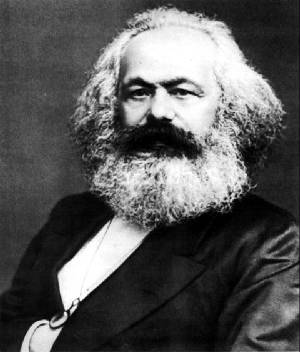|
A Marxist Lens
A Marxist tend to look at the world in
the sense that
all people are created equally and because of this all people should all have
the approximately amount of everything. Money food clothes everything; they
believe that the problems and the corruption come from people having more than
there fare share.

If you read “In a Dark Time” once it is very obvious
that it is about a man. A man who feels alone, as if he has no one in his
preverbal corner, against the world if you will. This man is in an area that he
is not even a little familiar with. He is in the woods; an area that can be
very frighten if one is not used to. This man has wondered into a cave for some
protection. But after reading this poem for a second or third time it becomes
evident that this man has left the rich and the wicked that have corrupted the
cities that he if familiar with. He has detached himself from the human world
in order to find a sense of equality in nature. He finds it more comforting to
be with animals than to be with the most corrupted of all animals the human
being,
|
 |
 |
 |
A Feminist Lens
The feminist is one who believes that
men and women
should have equally rights and opportunities. Which unfortunately is still not
the way it is in the world. Men typically earn more for doing the same jobs as
woman. Women are looked at differently in or culture and are exploited much
more frequently than any other group of people. Advertisers use the natural
beauty of the female form to sell products on a daily basis; many times they do
it with out the general knowledge of the public.

This is what exactly what Theodore Roethke is doing in
his poem “The Visitant.’ He uses the lure of a
beautiful woman to make a basically uninteresting poem more appealing to the
public. Even the title describes the woman as a visitor, leading the reader to
believe the woman is a one-night stand. This poem describes the average woman
as a figure that is to serve there male masters and is an abomination of
literature.
|
 |
 |
 |
|
A Psychological Lens
Psychological approaches are typically used
to examine the essence of human behavior in different pieces of work. Much of
poetry is, after all, nothing more than an individual’s expression of the world.
In these pieces, as the readers, we can try to analyze the poem’s narrative by exploring the motivations, defenses
and inner conflicts that may be going on. Sometimes psychological critics use
their tools not to examine the characters but to analyze the author in their search for meaning.

This is a psychoanalytic analysis of Roethke’s
“I Knew a Woman”. At first glance this is a seemingly innocent poem,
as the title would indicate, that that the narrator knew. It is divided into
four stanzas in which our narrator goes into detail about another aspect the women he knew, “lovely in her bones.” It is only upon a further examination that we find the blatantly-obvious sexual connotations. “She was the sickle; I, poor I, the rake, Coming behind her for her pretty sake
(But what prodigious mowing did we make.” We hear these sexual innuendos
again and again throughout the poem, making it very clear the narrator’s “ID” is in control. The only say his “ego” has is the poetic nature in which his driving forces are communicated.
|
 |
|
|
|

